The Importance of CRM Systems in Business
Customer Relationship Management (CRM) systems have become essential tools for businesses looking to enhance their customer interactions and drive growth. A CRM system is a technology that helps companies manage and analyse their interactions with current and potential customers.
One of the key benefits of using a CRM system is the ability to centralise customer data. By storing all customer information in one place, businesses can gain a comprehensive view of their customers’ preferences, purchase history, and communication history. This allows companies to personalise their interactions with customers, leading to improved customer satisfaction and loyalty.
CRM systems also enable businesses to streamline their sales processes. By tracking leads, managing opportunities, and automating repetitive tasks, sales teams can work more efficiently and effectively. This can result in increased sales productivity and higher conversion rates.
Furthermore, CRM systems provide valuable insights through reporting and analytics features. Businesses can track key performance indicators, identify trends, and make data-driven decisions to improve their marketing strategies and customer engagement efforts.
Another important aspect of CRM systems is customer service management. By integrating customer support functions into the CRM platform, businesses can provide timely and personalised support to their customers. This leads to faster issue resolution, improved customer satisfaction, and ultimately, increased retention rates.
In conclusion, implementing a CRM system is crucial for businesses looking to build strong relationships with their customers, streamline their processes, and drive revenue growth. With the right CRM solution in place, companies can gain a competitive edge in today’s highly competitive business landscape.
6 Essential Tips for Optimising Your CRM System
- Clearly define your CRM goals and objectives before implementing a system.
- Ensure proper training for all users to maximise the benefits of the CRM system.
- Regularly update and maintain data in the CRM system to ensure accuracy.
- Integrate your CRM system with other business tools for seamless operations.
- Customise the CRM system to suit your specific business needs and processes.
- Monitor key performance indicators (KPIs) related to customer relationship management.
Clearly define your CRM goals and objectives before implementing a system.
Before implementing a CRM system, it is crucial to clearly define your goals and objectives to ensure a successful integration. By establishing specific targets such as improving customer satisfaction, increasing sales productivity, or enhancing marketing campaigns, businesses can align their CRM strategy with their overarching objectives. This clarity not only guides the selection and customization of the CRM system but also helps in measuring its effectiveness in achieving the desired outcomes. Setting clear goals from the outset lays a strong foundation for leveraging the full potential of a CRM system to drive business growth and enhance customer relationships.
Ensure proper training for all users to maximise the benefits of the CRM system.
To maximise the benefits of a CRM system, it is crucial to ensure proper training for all users. Investing in comprehensive training programmes will empower employees to fully utilise the system’s features and functionalities, leading to improved efficiency and effectiveness in customer interactions. Proper training will enable users to navigate the CRM system with ease, accurately input and access data, and leverage advanced tools for customer relationship management. By equipping all users with the necessary knowledge and skills, businesses can enhance their overall productivity, streamline processes, and ultimately achieve greater success in managing customer relationships.
Regularly update and maintain data in the CRM system to ensure accuracy.
It is crucial to regularly update and maintain data in the CRM system to guarantee accuracy and relevance. By keeping customer information current and correct, businesses can make informed decisions, provide personalised experiences, and enhance overall customer satisfaction. Regular updates also help in identifying trends, tracking performance metrics, and improving the effectiveness of marketing and sales strategies. Ensuring that the CRM data is up-to-date enables businesses to maximise the benefits of the system and drive success in customer relationship management.
Integrate your CRM system with other business tools for seamless operations.
Integrating your CRM system with other business tools is a valuable tip that can significantly enhance the efficiency and effectiveness of your operations. By seamlessly connecting your CRM system with tools such as marketing automation platforms, email marketing software, and accounting systems, you can streamline processes, improve data accuracy, and ensure consistency across all touchpoints. This integration enables a more holistic view of customer interactions and empowers teams to work cohesively towards achieving common goals. Ultimately, integrating your CRM system with other business tools can lead to enhanced productivity, better decision-making, and ultimately, improved customer satisfaction.
Customise the CRM system to suit your specific business needs and processes.
Customising the CRM system to align with your specific business needs and processes is a valuable tip that can significantly enhance the effectiveness of your customer relationship management efforts. By tailoring the CRM system to accommodate your unique requirements, you can ensure that it seamlessly integrates with your existing workflows and captures essential data points specific to your business operations. This customisation allows for a more personalised approach to customer interactions, improved efficiency in managing leads and opportunities, and better insights through tailored reporting and analytics. Ultimately, adapting the CRM system to suit your business ensures that it becomes a powerful tool that drives growth and success in a way that is truly aligned with your organisational goals.
Monitor key performance indicators (KPIs) related to customer relationship management.
Monitoring key performance indicators (KPIs) related to customer relationship management is essential for businesses aiming to assess the effectiveness of their CRM system. By tracking metrics such as customer acquisition costs, customer retention rates, customer satisfaction scores, and conversion rates, companies can gain valuable insights into their relationships with customers. Analysing these KPIs allows businesses to identify areas for improvement, make informed decisions, and ultimately enhance their overall customer experience. Regularly monitoring KPIs related to CRM helps businesses stay proactive in addressing issues and optimising their strategies to better meet the needs and expectations of their customers.

